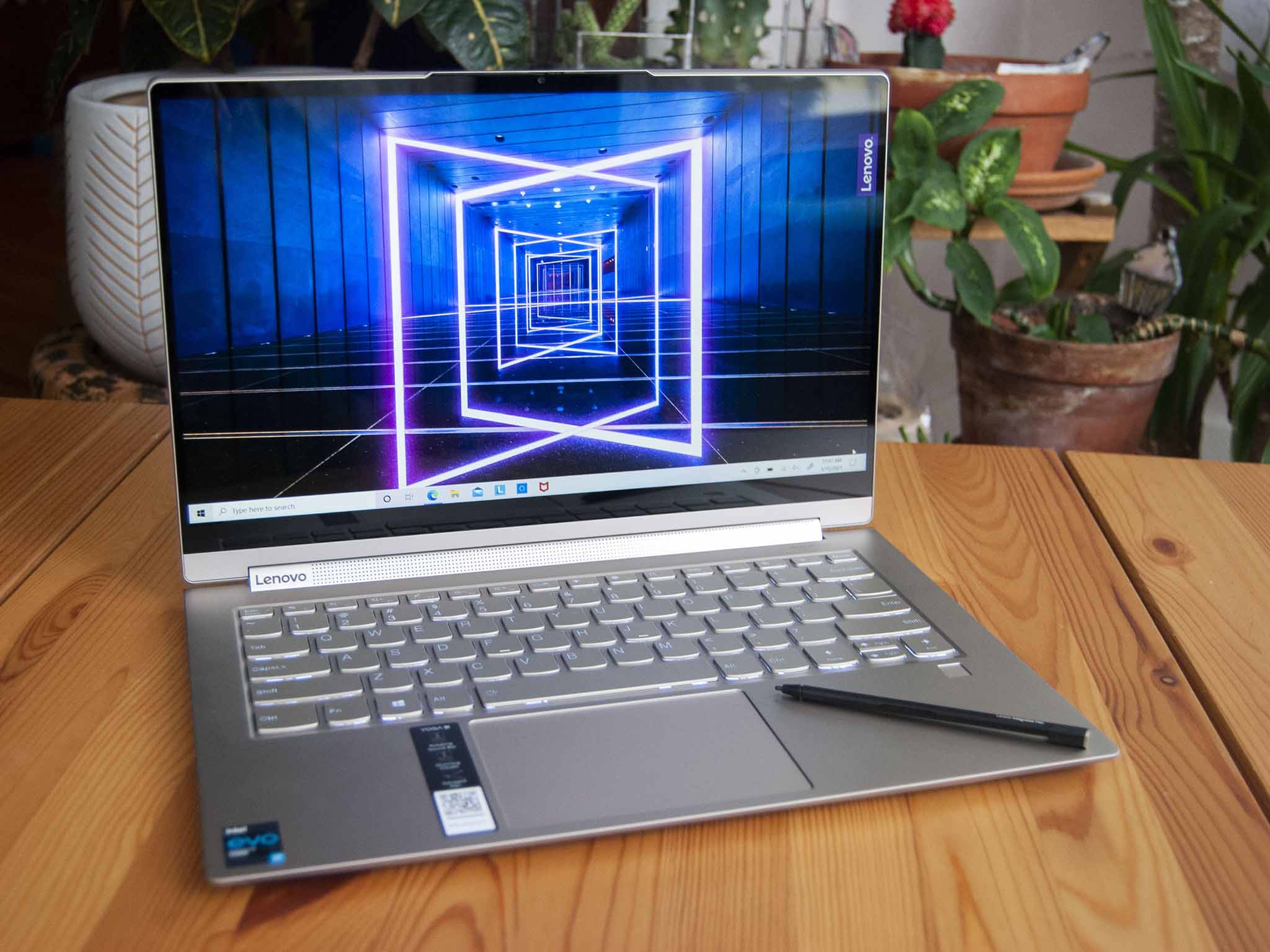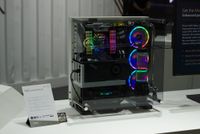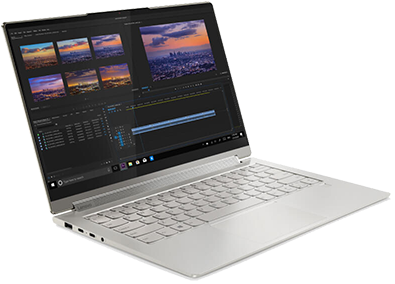
The Lenovo Yoga 9i series is a successor to the formidable Yoga C940 series, available in both 14- and 15-inch models. With the new, tidier naming scheme comes a bump up to Intel’s 11th Gen hardware and Intel Evo platform certification, improved TrueStrike keyboard, optional leather lid cover, and edge-to-edge glass touchpad, Thunderbolt 4 ports, and more. Ultimately, it’s still a premium convertible laptop that sits at the top of Lenovo’s Yoga lineup. I’ve been using the smaller 14-inch version for about a week to see exactly how the updated laptop fares and whether or not it’s worth your money.
Yoga C940’s Successor
Lenovo Yoga 9i 14
Bottom line: The Yoga 9i 14 would be that much better with a taller, anti-reflective display and an IR camera for some added security. Still, it is nevertheless an attractive convertible with a slick aluminum build, snappy performance and long battery life, comfortable typing, and outstanding audio.
Pros
- Built-in active pen for inking
- 11th Gen Intel and Evo certification
- Beautiful aluminum design
- Excellent audio setup
- 10+ hours battery life
Cons
- Still using a 16:9 aspect ratio
- No IR camera
- Edge-to-edge glass touchpad only available on the leather version
- Anti-glare display finish
Lenovo Yoga 9i 14 at a glance

Lenovo supplied Windows Central with a review unit of the Lenovo Yoga 9i 14 convertible laptop. It has inside an 11th Gen Intel Core i7-1185G7 quad-core processor (CPU), 16GB of LPDDR4x-4267MHz RAM that is soldered (no after-purchase upgrades), 512GB M.2 PCIe NVMe solid-state drive (SSD), and 14-inch FHD touch display with Dolby Vision and a garaged active pen. This configuration (albeit with a larger 1TB SSD) costs about $1,400 at Lenovo, though price often fluctuate due to common sales and rebates.
The review configuration is as low as about $1,080 at Best Buy, and priced at about $1,285 at Amazon.
If you’re looking to upgrade further, you can go with a 4K UHD display with 500 nits brightness, VESA DisplayHDR 400, and 90% DCI-P3 color reproduction. The extra pixels add a $100 premium in most cases.
Here are the exact specifications of the review unit I tested for this review.
| Category | Spec |
|---|---|
| OS | Windows 10 Home |
| Processor | 11th Gen Intel Core i7-1185G7 Four cores Eight threads Up to 4.8GHz |
| RAM | 16GB LPDDR4x-4267MHz Soldered |
| Graphics | Intel Iris Xe Integrated |
| Storage | 512GB M.2 NVMe SSD PCIe Gen 3×4 |
| Display | 14 inches 1920×1080 (FHD) Touch, glossy, IPS 16:9 aspect ratio Dolby Vision 400 nits |
| Pen | Lenovo Integrated Pen Built-in silo Rechargeable |
| Ports | Two Thunderbolt 4 USB-A 3.2 (Gen 2) 3.5mm audio |
| Audio | Four 2W speakers Soundbar hinge Dolby Atmos |
| Connectivity | Wi-Fi 6 (2×2) Bluetooth 5.1 |
| Camera | Front-facing 720p Privacy shutter |
| Keyboard | Three-stage backlight |
| Touchpad | Precision |
| Security | Fingerprint reader |
| Battery | 60Wh Rapid Charge Express |
| Dimensions | 12.57 x 8.51 x 0.57-0.61 inches (319.4mm x 216.4mm x 14.6-15.7mm) |
| Weight | 3.02 pounds (1.37kg) |
| Color | Mica |
Flawless aluminum build
Lenovo Yoga 9i 14 design and features
The Yoga 9i 14 hasn’t changed a lot physically compared to the C940 predecessor. The newer laptop weighs just a bit more but measures the same thickness. Width and depth have a mere millimeter shaved off — nothing really notable. With an all-metal build top and bottom, the 9i 14 is a near-flawless execution of Lenovo’s Yoga vision. The Mica finish on the aluminum hides fingerprints, lines are clean, and there are just enough rounded edges. The lid rotates 360 degrees on a soundbar hinge for excellent audio no matter how you’re using the laptop.
The soundbar hinge returns, making the Yoga 9i 14 an ideal choice for media and entertainment.
The soundbar has four total 2W speakers: two woofers and two tweeters. There’s more than enough volume to make other people in the same room uncomfortable (speaking from experience), and there’s no distortion or buzzing at higher volume levels. Audio is well-balanced, no doubt thanks to Dolby Atmos tuning, and I enjoyed listening to music while working on this laptop. Because the speakers are contained in the soundbar, there’s no risk of muffling audio with the Yoga 9i sitting in your lap.
Because it’s positioned in the middle of the laptop, rotating the display around to tent, stand, or convertible modes keeps audio pointing in your direction. It’s a design we first saw in the Lenovo Yoga C930, and it’s one I hope sticks around.

The thinness of the laptop undoubtedly puts a restriction on some ports, but at least the 9i 14 didn’t lose any connectivity compared to the C940. Instead, the two Thunderbolt 3 ports were upgraded to Thunderbolt 4, the lone USB-A port was upgraded to 3.2 (Gen 2), and the 3.5mm audio jack remains the same. All ports reside along the laptop’s left side, with the right side reserved for an embedded power button (no accidental presses thanks to its positioning) and garaged active pen.
If you’re a right-hander and want to use a wired mouse, the cable will have to snake across from the left side USB port, though Bluetooth 5.1 is included for wireless connectivity. For general wireless networking that is ready for the future, the laptop has Wi-Fi 6. No 4G or 5G connectivity is offered with the Yoga 9i 14.
Unfortunately, there’s still no IR camera for secure logins through Windows Hello. This was also an issue in the C940, and it’s a bit odd Lenovo didn’t add the feature when so many other premium laptops offer it standard. However, the front-facing 720p camera is above average; those who frequently video chat shouldn’t have a problem here, even on a professional level. A tiny camera shutter that blocks the aperture and disables it at a hardware level is present for added privacy.
Set into the right palm rest is a fingerprint reader that does its job well through Windows Hello. There were no issues here, and I could sign in securely without issue each time I used it. If you opt for the Yoga 9i 14 with Black color and a leather lid covering, that fingerprint reader will still be present beneath an edge-to-edge glass palm rest covering—more on that to come.
Altogether the Yoga 9i 14 feels like a premium convertible laptop. It has just enough weight to seem durable, there’s not enough flex in the lid to cause any concern, and the soundbar hinge is just tight enough to keep the lid in place without making the laptop a struggle to open. A small lip along the top bezel, stamped with a “Yoga 9 Series” moniker, makes it easier to pull the two machined edges apart.
16:9 aspect ratio
Lenovo Yoga 9i 14 display and inking

A taller aspect ratio would pay off huge for the Yoga 9i 14.
Two display options are available with the Yoga 9i 14. The review unit here has the 1920×1080 (FHD) option, but you can go with 4K UHD for about $100 more in most cases. What smacks me first is the 16:9 aspect ratio. As many laptops from varying price ranges move to 16:10 and 3:2, the traditional 16:9 is beginning to look outdated. Laptops look so much cleaner when the chin below the display is removed (the usual outcome of heightening the screen), not to mention the extra screen real estate available for productivity.
One of the Yoga 9i 14’s main competitors is the HP Spectre x360 14, which has a 3:2 aspect ratio OLED touch display and similar pricing. In this regard, Lenovo is outgunned. Bezel along the top and sides is slim (the chin is still present), and there’s not quite enough brightness to offset glare from the glossy finish.
In general, the color looks spot on, confirmed by testing with my SpyderX Pro colorimeter. In testing, the display achieved 99% sRGB, 75% AdobeRGB, and 78% DCI-P3 gamut coverage, as well as 360 nits brightness at its highest. That’s significantly lower than the advertised 400 nits. Dolby Vision is present, boosting the picture with compatible content.
Opting for the 4K display will net you about 100 nits more brightness and better DCI-P3 color gamut coverage. It also introduces VESA DisplayHDR 400 for improved color and contrast when viewing HDR content. You’ll still have the same 16:9 aspect ratio no matter the resolution.
Built into the rear edge of the Yoga 9i 14 is a silo for the Lenovo Integrated Pen. It’s a lot like previous-generation active pens, though it now has an elastomer tip for smoother writing. The 4,096 pressure sensitivity levels contribute to a natural feel, and casual users shouldn’t find much to complain about. I wouldn’t recommend it for professional artwork, but it will do well-taking notes and sketching. While tucked away in its silo, the built-in battery tops up its charge.
New TrueStrike technology
Lenovo Yoga 9i 14 keyboard and touchpad

Lenovo has incorporated its TrueStrike technology — generally reserved for Legion gaming laptop keyboard — into the Yoga 9i 14, and for good effect. While the keyboard doesn’t measure up to the ThinkPad line’s greatness, I typed thousands of words on the 9i without any major issues. Coming from the XPS 13 9300, I did find the Yoga’s keys to be spaced a bit far apart, but ultimately it didn’t really affect typing speed.
The Black and leather version of the Yoga 9i 14 has edge-to-edge glass below the keyboard.
Thanks to TrueStrike, the big change is a softer landing when bottoming out on the deck. It is hard to say how big of a change this is, but the keys certainly have a satisfying bounce to them. Page Up, and Page Down keys are incorporated into the Up and Down Arrow keys, which will likely irritate anyone who often uses them. This seems to be a common trend among Ultrabooks as they shrink down in size; the doubling up is also present on the XPS 13. A three-stage white backlight (off, bright, and brighter) plays well with the silver keys for a clear definition.
The Mica finish version I have for review has a standard Precision touchpad that makes good use of the available space below the keyboard. The glass surface tracks well and feels nice under fingers. The actual click feels a bit hollow, but it’s clear the hinge is located high on the pad, allowing you to physically click (not just touch click) just about anywhere.
If you opt for the Yoga 9i 14 version with a Black finish and leather lid covering, the entire palm rest will be covered in edge-to-edge glass. This includes covering the touchpad and fingerprint reader, which still ultimately reside there and work as usual. This undoubtedly adds a lot of style to the laptop, though I can’t comment on how well it all works together.
Perks of Intel Evo
Lenovo Yoga 9i 14 performance and battery

The Yoga 9i 14 packs in 11th Gen Intel “Tiger Lake” CPUs and Intel Evo platform certification. This combination translates to noticeably snappy performance, even running on battery life. It brings instant-on capabilities that have you back to work immediately. And, perhaps most importantly for a thin and light laptop, it delivers excellent battery life.
Testing with PCMark 10’s Modern Office battery rundown, the Yoga 9i 14’s 60Wh battery managed 10 hours and 44 minutes of life when running on “Better Performance” with about 50% display brightness. This is with the FHD display, and that number will undoubtedly drop if you go with 4K. Still, you shouldn’t have a problem getting through a standard eight-hour workday when tackling productivity tasks. Rapid Charge Express is present, allowing you to get about three hours of battery life from just 15 minutes of charging.
Gaming on the Yoga 9i 14 is possible thanks to integrated Intel Xe graphics, but this isn’t a gaming laptop with the right cooling for sustained high performance. Don’t expect high framerates with high AAA gaming settings; treat the laptop instead as an indie gaming platform, and you’ll be much happier. It can also easily handle editing work, as its real-world performance output is somewhere between NVIDIA’s dedicated MX250 and MX350 GPUs. Testing with Geekbench 5’s OpenCL benchmark, the integrated graphics scored 18,646.
I ran some synthetic benchmarks to see how well the Yoga 9i 14 compares to other laptops we’ve recently reviewed.
Performance from the Samsung PM981a SSD is astounding, and unless you happen to receive a slower drive in your model, it should serve you well. Unlike RAM, which is soldered to the board, the M.2 SSD can be upgraded after purchase.
Plenty of reasons why
Should you buy the Lenovo Yoga 9i 14?

Who it’s for
- Anyone who wants a premium convertible laptop with aluminum chassis
- Anyone who wants Intel 11th Gen performance and Evo platform perks
- Anyone who wants a laptop with a touch display and built-in active pen
- Anyone who wants to spend more than $1,000
Who it isn’t for
- Anyone who wants a laptop with a dedicated GPU
- Anyone who wants to spend less than $1,000
- Anyone who wants a 16:10 or 3:2 aspect ratio
- Anyone who wants Lenovo’s ThinkPad typing experience and security features
It really is a great time to be shopping for a premium Windows convertible laptop. Dell’s XPS 13 2-in-1 (9310) brings 11th Gen Intel performance, Evo platform certification, a 16:10 aspect ratio for the touch display, and an overall high-end build quality. It does not, however, include a USB-A port, garaged active pen, or rotating soundbar hinge.
The Surface Book 3 is a great option if you want a convertible laptop that completes separates in the middle. It has a high-resolution touch display, 10th Gen Intel Core CPUs, and even dedicated NVIDIA GTX 1660 or GTX 1660 Ti graphics for outstanding performance. It is lacking in modern port selection and does cost significantly more than the Yoga 9i 14. Have a look at our Microsoft Surface Book 3 15 review for an in-depth look.
The HP Spectre x360 14 is no doubt the Yoga 9i 14’s biggest competition.
Perhaps the biggest competitor for the Yoga 9i 14 is the HP Spectre x360 14. It sits at the top of our list of best Windows laptop options, and for good reason. It has a beautiful 13.5-inch OLED touch display with boxy 3:2 aspect ratio and 3000×2000 resolution, 11th Gen Intel Core CPUs and Evo platform certification, IR camera, microSD card reader, 66Wh battery, top-firing speakers, and inking support. It also starts at about $1,330, putting it in the same price range as Lenovo’s Yoga 9i.
So should you buy the Yoga 9i 14? It has a lot going for it, including the outstanding soundbar audio, built-in active pen, flawless aluminum design, and strong performance and battery life. If you don’t mind the 16:9 display aspect ratio, lack of IR camera, and glossy display finish, the Yoga 9i 14 should prove to be a versatile convertible capable of work, gaming, inking, and media consumption. If you can snag a Core i7 FHD model for around the $1,000 mark, you’re already ahead of the game. And if 14 inches just isn’t quite big enough, I’ll be taking a look at the Yoga 9i 15 next to see how it fares in the competitive market.
Yoga C940’s Successor
Lenovo Yoga 9i 14
Mostly a performance hardware update
The Yoga 9i 14 features Intel’s high-end mobile performance and the Evo platform, all contained in a high-end build that remains mostly unchanged since the C940. That doesn’t mean it’s not still a premium convertible packed with features that make it ideal for work and media.
We may earn a commission for purchases using our links. Learn more.

These are the biggest PC announcements from CES 2021
CES 2021 was different in that it wasn’t held at a physical location. Instead, companies relied on press kits and virtual presentations to showcase all the new products. We’ve rounded up the best PC-related announcements in case you happened to miss the show.




